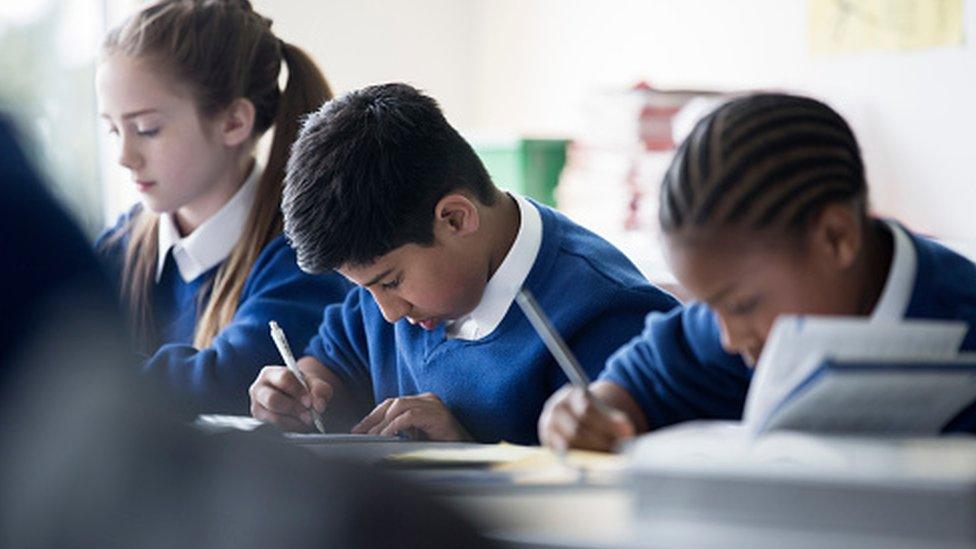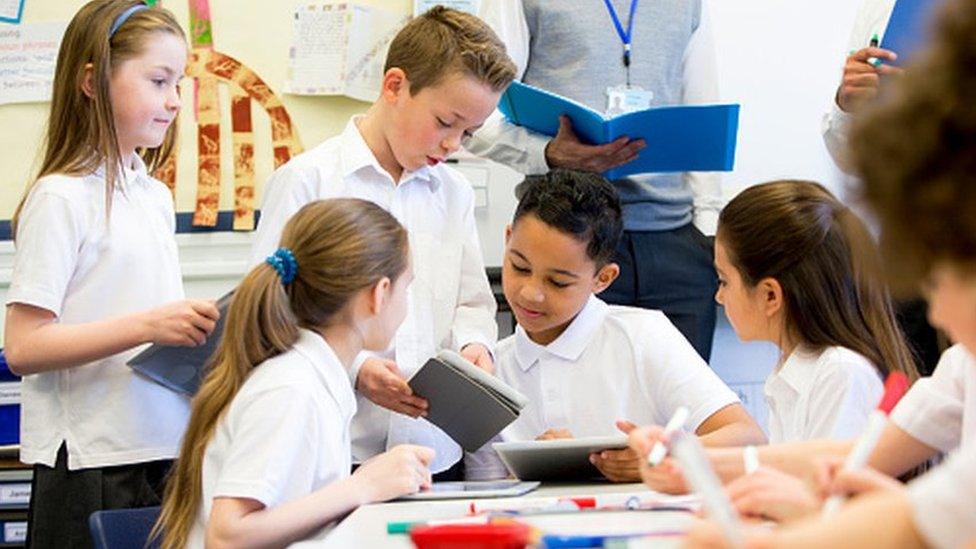Teachers back moves towards primary Sats boycott
- Published

Children sit compulsory tests at age seven and 11
Teachers have backed plans for a possible boycott of primary school tests in England next year.
The National Union of Teachers says the tests for seven and 11-year-olds are damaging to children and education.
One delegate likened Sats to the "monster stalking our schools". Another said they needed to be "decapitated".
The government is consulting on the future of primary assessment, and may scrap the tests for seven-year-olds and introduce a baseline test in reception.
But, if agreed, this would not be put in place before 2020.
On Sunday, teachers at the NUT conference backed a motion for an indicative ballot on a Sats boycott, and are expected to debate the matter further on Monday and back plans for a full ballot.
Siobhan Collingwood, a teacher from Lancaster, told the union's conference in Cardiff that Sats were "the monster that is stalking our schools".
She was one of a dozen speakers who spoke passionately against the tests and in favour of ending them.
Samantha Nicholson-Hickling, a teacher from Oldham, said the current model for testing children was wrong
'Children crying'
Last year, when 47% of 11-year-olds failed a new set of tougher tests, Ms Collingwood said, she had seen children cry during the tests.
She had gone around "rubbing pupils' backs", she told delegates.
Now instead of carrying on with the tests, the union needed "to bring down the whole stinking edifice" of the assessment system, she added.

Lambeth delegate Jessica Edwards said the monster that was Sats needed to be "decapitated".
"Sats in our schools is damaging to children and their education, damaging to the self-esteem and mental health and all the things that they need to succeed as they go through their education.
"We all know that last year's tests were the worst they ever had.
"They saw huge numbers of our children not 'failing' as they were labelled but being failed by the assessments that they undertook."
New tests
In 2016, the first set of Sats on the new national curriculum were taken by pupils in England's school.
The pass rate fell from 80% in 2015 to 53% for the nation's 11-year-olds.
Chris Ayton, a delegate from Manchester, was given a standing ovation after exclaiming that teachers should be "liberating" children's minds, not preparing them to answer tests on things they did not understand.
Kevin Courtney, NUT general secretary, said teachers had been saying the system was so broken that they wanted to stop it.
"Primary education should be a time in children's lives when they develop a love of learning, not a fear and dread of failure.
"Drilling within a narrow set of disciplines and expectations is taking the joy out of learning and much of it is of questionable educational value.
"Children are being put under unnecessary stress and teachers' workload is heavily impacted upon."
The Department for Education says tests should not be stressful, and rigorous testing helps raise standards in schools.
It maintains that parents have a right to expect testing in schools to show whether their children are leaving primary school with the right skills in maths and literacy.
A spokeswoman said: "We want a long-term, stable and proportionate system for primary assessment that measures the progress that children make throughout their time at primary school fairly and accurately, one that recognises teachers' professionalism in assessing their pupils and which does not impose a disproportionate burden.
"We have worked with the teaching profession on how best to establish this and we are currently consulting on a number of proposals."
- Published30 March 2017

- Published5 July 2016
